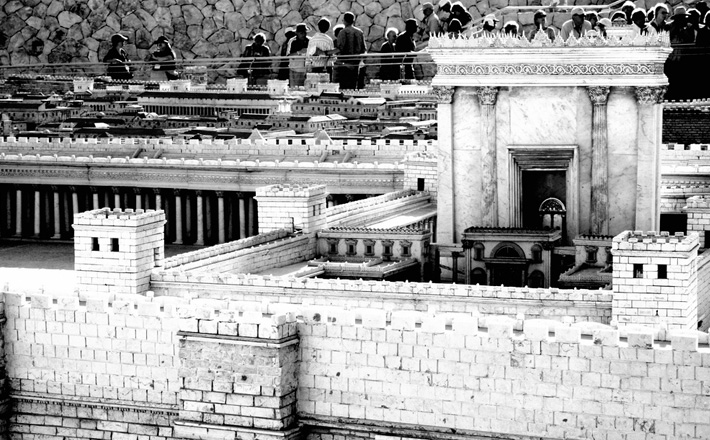Commentary on Luke 21:5-19
Whenever a disaster strikes, it doesn’t take long for some prominent Christians to blame it on the secularization or moral permissiveness of society.
On a September 13, 2001, appearance on The 700 Club, Rev. Jerry Falwell blamed the 9/11 terrorist attacks on certain groups and organizations he characterized as promoting “an alternative lifestyle” and trying to “secularize America.”1 Austrian priest Rev. Gerhard Wagner wrote in a 2005 parish newsletter that Hurricane Katrina resulted from the indescribable amoral conditions of New Orleans.2 Recently, the Westboro Baptist Church has attained notoriety for this line of thinking.
Anyone who wants to justify their belief that God uses wars and natural disasters to punish people for “attacking” Christianity can find material in Luke 21:5-19 to support this view. This passage presents Jesus predicting the Jerusalem temple’s destruction (vv. 5-6) as well as more general catastrophes (vv. 7-10) that are preceded by an intense persecution of Christians (vv. 12-19). I propose, however, that we take a closer look at the different sections of 21:5-19 to see if other, more compelling readings are possible.
By the time Luke puts the finishing touches on these verses, the temple’s destruction has already happened. Luke’s Gospel is dated to about 85 ce, 15 years or so after the destruction of the Jerusalem temple by the Romans in 70 ce, which means that for Luke’s readers what Jesus says in Luke 21:5-6 is more a reflection on the temple’s destruction than a prediction of it. Luke uses the destruction of this magnificent temple to make a statement on the impermanence of human achievement. In response to their wonder at the temple’s beauty, Jesus attempts to divert the attention of his audience from their fascination with “these things that you see” (21:6). Their focus should be on something else. What, exactly, is not specified, but immediately before this exchange Jesus drew attention to a poor widow in the temple (21:1-4). Perhaps Luke’s Jesus thinks his audience should focus their attention on the poor, not on the temple building.
Those listening to Jesus teach in the temple, however, remain concerned with what will happen to the building (Luke 21:7). In response, Jesus moves from discussing a specific catastrophic event to more general statements about the coming of false prophets, wars, and other calamities (21:7-12). Here Luke employs language and imagery that is conventional in apocalyptic literature from this period (for example Daniel 11:20, 25, 44; 4 Ezra 13:31; Revelation 6:12; 8:5; 11:13, 19; 16:18).3 As readers we now have to decide how we are going to interpret Luke 21:7-12. Are we going to read these as literal predictions of Jesus, or are we going to read this section in light of the aims of apocalyptic literature? If a story begins “Once upon a time,” do we take literally the story’s events, or do we adjust our expectations because we recognize it as a fairy tale that is trying to entertain even as it conveys a moral or lesson? The decision we have to make in reading Luke 21:7-11 is similar. A specific genre (apocalyptic) is introduced, meaning we should adopt the interpretive lenses that help us understand this genre on its own terms.
Apocalyptic literature uses unsettling language and imagery as a means to assure the faithful that they should keep their trust in God even when facing the most challenging of circumstances. Sure enough, while describing the terrible events, Jesus tells his listeners not to be afraid (Luke 21:9). There is nothing particularly original or specific about Jesus’ “predictions” here. Every age has its own false prophets, wars, natural catastrophes, and so on. We will misread 21:7-11 if we think Jesus is describing a specific set of calamities. The point is that when bad things happen — and they will — we should “not be terrified” (21:9) or follow anyone proclaiming these are signs of God’s judgment and the end (21:8). Instead, we should trust that God remains present in our lives.
That assurance of God’s faithfulness to us in the face of difficult times is the real concern of this passage is confirmed by Luke 21:12-19. Jesus details the persecution that his followers can expect to face: arrests; persecution; trials before government authorities; betrayal by family and friends; hatred on account of Jesus’ name; and even execution. Throughout his Gospel, Luke depicts Jesus as a prophetic figure who risks rejection and death as a result of his prophetic message (see especially Luke 4:16-30). Anyone who follows Jesus can expect the same hostility that Jesus and Israel’s great prophets endured. Indeed, the Acts of the Apostles (written by the same author who wrote Luke’s Gospel) provides numerous examples of early Christian leaders facing precisely the sort of troubles that Jesus describes in 21:12-19.4
But does Jesus in Luke 21:12-19 tell his audience they should lay blame on a particular person or group of people, on their society, or even on their enemies, for such treatment? No. He says that persecution is “an opportunity to testify” (21:13). Just as God gave Moses and other prophets the capacity to speak to and confront their doubters and opponents (for example Exodus 6:28-7:13; Jeremiah 1:6-10), Jesus himself will provide strength and wisdom for such testimony (Luke 21:15). Using a proverb that signifies divine protection, Jesus tells them that not a hair on their head will perish (Luke 21:18; see also 1 Samuel 14:45; 2 Samuel 14:11; 1 Kings 1:52).5 Ultimately, their experience of persecution will not end in death but in a victory for their souls (Luke 21:19). Underscoring all of these statements in 21:12-19 is the importance of trusting in God even in the midst of hardship and persecution.
A close reading of Luke 21:5-19 shows that using this passage as a springboard for proclaiming God’s judgment on society would miss the point. Rather, the passage warns us about becoming too fixated on temporary human institutions, perhaps with the implication that we should attend to the poor in our communities instead (21:5-6; see also 21:1-4), and it exhorts us to be firm in our trust in God when calamity and persecution strike (21:7-19). Despite its language and imagery of destruction, Luke 21:5-19 is ultimately a passage grounded in hope — in the hope that God remains present in the world and in one’s life even when things have gotten so bad that it feels like the world is closing in on us.
Notes:
1 https://www.youtube.com/watch?v=H-CAcdta_8I
2 http://www.cbsnews.com/news/pope-rescinds-hiring-of-katrina-priest/
3 Joseph A. Fitzmyer, The Gospel According to Luke (X–XXIV), Anchor Bible 28A (New York: Doubleday, 1985), 1336-1337.
4 See R. Alan Culpepper, “The Gospel of Luke,” in The New Interpreter’s Bible 9 (Nashville: Abingdon, 1995), 400-402.
5 Fitzmyer, Luke, 1341.


November 13, 2016